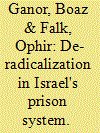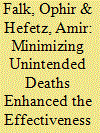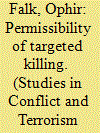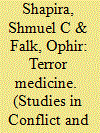| Srl | Item |
| 1 |
ID:
120432


|
|
|
|
|
| Publication |
2013.
|
| Summary/Abstract |
An effective de-radicalization process in prisons is intended to facilitate the renouncement of violence and terrorism by those that have carried out such offenses. A key lesson that can be drawn from Israel's de-radicalization efforts is that it is possible, indeed recommended, to treat inmates-regardless of their level of radicalization-in a dignified and humane manner. However, Israel's ability to significantly de-radicalize security prisoners is limited if it is at all existent in its current form. Security prisoners with the potential for positive change should be placed in a different, perhaps foreign setting. This article provides an overview of Israel's prison system, the challenges it faces, its efforts to de-radicalize security inmates and suggests additional courses of action.
|
|
|
|
|
|
|
|
|
|
|
|
|
|
|
|
| 2 |
ID:
165315


|
|
|
|
|
| Summary/Abstract |
Targeted killing has become a primary counterterrorism measure used by a number of countries in their confrontation with lethal threats. This article focuses on the impact of unintended deaths on the effectiveness of targeted killing. The article evaluates the effectiveness of targeted killings carried out in the Israeli–Palestinian conflict theater that resulted in unintended deaths, compared to the effectiveness of targeted killings where the intended target is the sole person killed. Using multivariate analysis, we demonstrate that targeted killings with unintended deaths were followed by a greater number of suicide bombings and associated casualties compared with targeted killings with no unintended deaths. Based on these findings, nations involved in such conflicts should strive to inflict as few unintended deaths as possible, not only because it is morally right, but also because it is more effective in mitigating terrorism.
|
|
|
|
|
|
|
|
|
|
|
|
|
|
|
|
| 3 |
ID:
132175


|
|
|
|
|
| Publication |
2014.
|
| Summary/Abstract |
Targeted killing has become an increasingly prevalent tactic employed by states in their efforts to counter terrorism. Despite its widespread use, the criteria for targeted killing permissibility have remained vague. This article identifies and evaluates the circumstances under which targeted killings can be considered permissible and looks at on-the-ground implementation by Israel and the United States. While both Israel and the United States may have largely adhered to the laws of armed conflict, in practice, discrepancies in implementation exist. This is primarily due to the ambiguity of the "distinction" and "proportionality" principles, two key legal and moral criteria that need further clarification.
|
|
|
|
|
|
|
|
|
|
|
|
|
|
|
|
| 4 |
ID:
110856


|
|
|
|
|
| Publication |
2012.
|
| Summary/Abstract |
The surge in mass casualty terror attacks during the first decade of the 21st century presented a special challenge for health organizations. Unique types of injury resulting from these Mass Casualty Events called for special capabilities to restore the balance between immediate demands and scarce resources. Post Traumatic Stress Disorder (PTSD), to both victims and healthcare providers and first responders required extra knowledge and early intervention. All these and the concerns of the possibilities of non-conventional weapons terror attacks, led to the defining of "Terror Medicine", a new medical field. This field evolves the medical macro management of terror attacks, the focused clinical management of the specific injuries and coping with the aftermath consequences. The scope of Terror Medicine is: Prevention, Preparedness, Response and Recovery. The evolution and trends of Terror Medicine is discussed in this article.
|
|
|
|
|
|
|
|
|
|
|
|
|
|
|
|